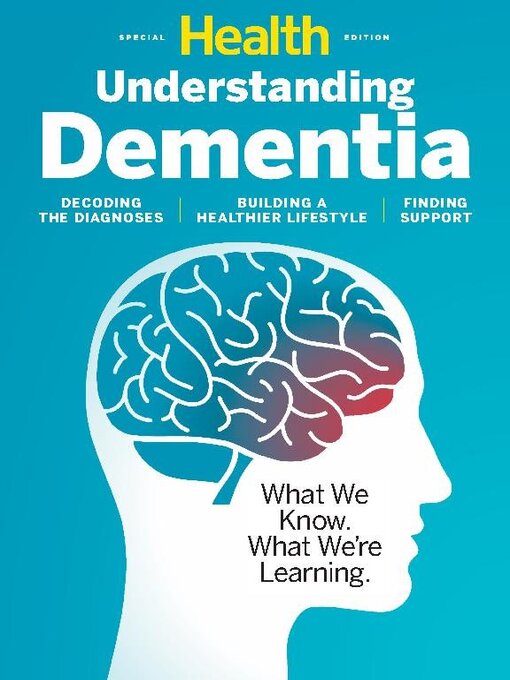More than a third of adults will have been diagnosed with dementia, the progressive loss of cognitive function, by the time they reach the age of 90. Though the disorder is widespread, it is not an inevitable part of aging. This special edition of Health decodes the subsets of dementia and details the steps you can take throughout your life to keep it at bay and promote healthy aging. Topics include questions to ask your doctor after diagnosis, an overview of Alzheimer’s disease, how to prevent falls at home, and tips for loved ones to cope.
HEALTH: UNDERSTANDING DEMENTIA • What We Know. What We’re Learning.
UNDERSTANDING DEMENTIA • Learning the causes and risk factors is the first step to treating this complex disease.
OPENER
THE EARLY SIGNS • Occasional memory lapses are normal as we age. But increasingly frequent episodes or personality changes could mean something more serious is developing, even as early as your 50s.
TESTING FOR DEMENTIA • Determining the presence of dementia relies on various tests in various forms.
DISPARITIES IN CARE • Dementia is particuarly common in older African Americans. Yet those patients are less likely to receive a timely diagnosis.
WHAT IS ALZHEIMER’S DISEASE? • This progressive brain disease typically occurs in people over age 65. There’s no cure, but treatment options and therapies can help slow the decline.
HOW ALZHEIMER’S PROGRESSES • There are seven distinct stages of Alzheimer’s, each defined by specific characteristics.
STAGES OF LEWY BODY DEMENTIA • What to expect asthe condition progresses.
WHAT IS VASCULAR DEMENTIA? • This subset, which often occurs along with Alzheimer’s disease, affects blood flow to the brain.
DOES PARKINSON’S DISEASE CAUSE DEMENTIA? • Dementia can occur in the later stages of Parkinson’s disease and may cause hallucinations, confusion, agitation, and memory loss.
OPENER
TRAINING FOR YOUR BRAIN • Treat your mind like a muscle so it stays strong as you age. Here’s how.
THE RELATIONSHIP BETWEEN MENOPAUSE AND ALZHEIMER’S • Here’s how menopause changes the brain and how you can reduce your risk of Alzheimer’s.
SURPRISING CAUSES OF MEMORY LOSS LATER IN LIFE • These lesser-known factors may affect your risk of dementia. Here’s how to lower your chance of developing the disease.
HOW TO PREVENT FALLS AT HOME AS YOU AGE • Simple ways you can make your home safer, with checklists and tips for fall prevention.
OPENER
A CAREGIVER’S GUIDE TO COPING • Alzheimer’s disease, the most common type of dementia, is difficult for both patients and caregivers. But loved ones can learn to adjust to the changes.
LIVING WITH ALZHEIMER’S DISEASE • The author learned she had the disease in 2018. She reflects on her diagnosis, support systems, and coping mechanisms.
WHAT IS CAREGIVER BURNOUT? • Frequent expressions of anger, sadness, and frustration are possible signs of burnout. Here’s how you can prevent it.
A GUIDE TO IN-HOME SENIOR CARE • Warning signs that your loved one might need it, and how to find services that can help.
THE BENEFITS OF ROUTINES FOR THOSE WITH DEMENTIA • How consistent schedules can help with Alzheimer’s disease.
WHAT THEY KNOW NOW • Here’s what people caring for loved ones with dementia wish they had known earlier in the process.
Health US - Special Issues • Understanding Dementia
Photo Credits
TELLING FIGURES • The number of dementia cases worldwide is expected to increase. But medical advancements and lifestyle changes offer hope.
BACK PAGE
